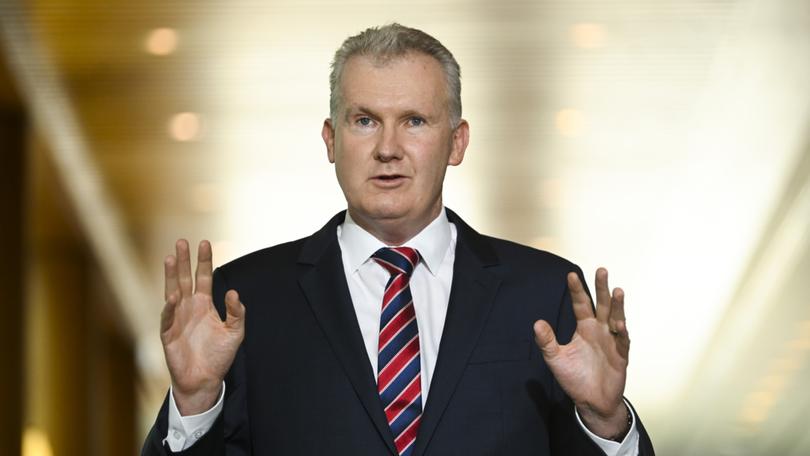
The cost-of-living crisis, energy and housing have dominated the 2025 election campaign.
Much less airtime has been given to the arts, a $64 billion industry facing serious threats.
Diminishing profits due to rising production costs, unregulated use of AI and a lack of Australian content on streaming platforms are among the most pressing issues for the arts sector today.
Artists — among the lowest-paid workers in the country — are particularly vulnerable to cost-of-living pressures.
According to research by RMIT University and the University of Melbourne, artists earn an average annual income of $13,937 from their arts practice, far below the minimum wage of $47,500.
So, what support can the arts sector expect from this election campaign?
With the final week of campaigning underway, ABC Arts looks at what — if any — arts policies the major parties are offering and asks what the arts sector wants.
Labor policy
Labor introduced Australia’s first national cultural policy in 2023. Titled Revive, the five-year plan included $286 million in funding delivered across four years.
It followed 10 years of funding cuts under the Coalition government, a period that saw federal arts spending fall by 22.7 per cent per capita.
“There is a national interest in having a strong art sector,” Federal Arts Minister Tony Burke tells ABC Radio National’s Arts in 30.
However, he acknowledges there are “vulnerabilities in the sector”, such as the cost-of-living crisis and insurance premium blowouts.
The Revive policy sought to address some of these pressures through key commitments such as a digital rights lending scheme to pay authors, illustrators and editors when their ebooks and audiobooks are borrowed from libraries (introduced in June 2024).
The Albanese government has so far delivered 66 actions under Revive, including establishing funding body Creative Australia and allocating $80 million to assist in establishing the Aboriginal and Torres Strait Islander Art Gallery of Australia (ATSIAGA) in Mparntwe/Alice Springs.
The government failed to deliver on its promise to introduce local content quotas for streaming companies by July 1, 2024.
Burke says he’s been advocating for content quotas since 2013, before streaming companies changed the television landscape.
“I absolutely share the frustration that we haven’t delivered on the timetable that was in the cultural policy. I have not given up on being able to do this.”
The minister says the government has encountered “pushback” from both the US government and streaming companies.
“Effectively, we’ve had to not simply do our consultation with the streaming companies, we’ve had to do it in the context of the free trade agreement with the United States as well and that has meant it has been slower than I wanted it to be.
“This is not simply a Trump problem. This happened under the Biden administration.”
Burke says tech companies’ unauthorised use of authors’ work to train AI technology amounts to theft.
Earlier this month, Burke announced an additional $16.4 million in funding over two years to extend the Revive Live program supporting live music venues and festivals, bringing total government investment in the program to $25 million.
The five-year plan is up for renewal in the next term of government, and Burke says consultation for the next cultural policy will begin “straight away” if Labor wins the election.
“That’s when the big decisions get made.”
The Coalition
As in previous years, the Coalition is going to the election without an official arts policy.
Shadow Minister for Science and the Arts Claire Chandler did not respond to ABC Arts’ requests for an interview.
Chandler has made one arts-related announcement during the election campaign: a pledge to match Labor’s plan to invest $18 million in the Jewish Arts Quarter project in Victoria, an arts and community hub planned for Elsternwick.
The Greens’ arts policy
In February, the Greens announced an arts policy, which includes:
- A proposal to run a pilot Living Wage for Artists program for 10,000 artists, like the BIA grant in Ireland, which pays artists $580 per week.
- An artist in residence program for public schools and libraries.
- $2 billion investment over 10 years in the future sustainability of the arts.
- Live music tax offsets and $20 million each year in funding for festivals.
The Greens are calling for streaming platforms to invest 20 per cent of Australian subscriber revenue into local content.
Sarah Hanson-Young, the Greens’ arts spokesperson, says she is frustrated by the government’s delay in introducing local content quotas promised under Revive.
“For far too long, we’ve seen the big streaming companies [such as] Netflix, Disney [and] Amazon pick up a huge number of subscriptions in Australia … with no requirement for these big companies, which tend to be based in the US, putting back into the local Australian industry.”
Hanson-Young says streaming giants should invest in local Australian content.
The Greens’ policy also includes the overhaul of Creative Australia in the wake of Khaled Sabsabi’s sacking as Australia’s representative at the Venice Biennale.
Hanson-Young says the episode was mishandled at the highest level.
“[Creative Australia] should be there defending artistic freedom of expression. It shouldn’t be trying to knock off the edges to make things less topical and more banal, and that is the dangerous precedent that has now been set.
“In order to restore the integrity of Creative Australia, the peak arts body in the country, we need to spill the board and get a new CEO.”
Hanson-Young says the Greens are committed to representing the interests of artists.
“Art is such a fundamental part of a working and successful democracy, and I want that to be front and centre of everything that we do.”
If the election results in a minority government, the Greens will prioritise its fully costed arts policy in any negotiations.
“I’ve been in minority government before … I know how this works, and often it’s having the ideas on the table that you can push when the opportunity arises,” Hanson-Young says.
What does the arts sector want?
Save Our Arts
Save Our Arts is a grassroots campaign established by members of the artistic community calling for greater investment in the arts.
“We’re seeing lots of trends away from Australian art and culture and content and towards international tech giants, tech billionaires, making the decisions about the sort of music, art, literature, culture that local audiences get to see and enjoy,” one of the group’s organisers, Ben Eltham, told ABC Arts.
Save Our Arts wants the successful government to introduce:
- A cross-platform levy, which requires streamers and broadcasters to pay a levy if they fail to meet a 25 per cent quota of Australian content.
- A Koala Stamp to label Australian content on streaming platforms.
- A $10 million translation fund to increase the reach of Australian writing.
- Production offsets and an insurance fund for performing arts, live music and stage shows.
- A 10-year $5 billion cultural infrastructure fund to oversee investment in galleries, theatres, cultural centres and libraries.
Save Our Arts is also calling for the introduction of an AI Act, which would include a Made by Humans stamp to alert audiences to AI-generated content.
“We were told that AI would do the drudgery work, and it would free us up to have more free time. Instead, what it seems to be doing is stealing the jobs of artists and making billionaires richer,” Eltham says.
Tax rebates including location and post, digital and visual effects (PDV) offsets are designed to attract large-scale film projects such as Furiosa: A Mad Max Saga to Australia.
Screen Producers Australia
A regulatory framework for streaming services is at the top of Screen Producers Australia (SPA) CEO Matthew Deaner’s arts policy wish list.
“Many other territories around the world have done that, [and] we were promised it as part of the Revive policy that w[as] announced in [20]23,” he says.
Deaner says the delay has cost the local screen industry thousands of jobs, millions of dollars in missed investment opportunities and the chance for Australians to see their stories on screen.
Second on SPA’s agenda is to provide appropriate funding to institutions such as the ABC, SBS and Screen Australia to enable them to produce Australian stories to compete in a global content market.
“There are so many incredible global stories available on these [international] streaming services on many platforms and we have to be able to compete with that,” Deaner says.
National Association for the Visual Arts
“There’s been a really welcome shift in how the arts are valued in Australia and increasing public recognition of artists’ vital role in shaping and enriching communities at different levels,” says National Association for the Visual Arts (NAVA) executive director Penelope Benton.
However, Benton says too many artists are faced with economic precarity due to factors such as limited employment opportunities, the prevalence of unpaid and underpaid work and inconsistent tax rules.
NAVA wants to see cost-of-living support delivered to artists, such as the rollout of a living wage program like that promoted by the Greens, more creative fellowships, superannuation paid on artists’ fees and tax exemptions for grants and prize monies.
“If you win the Archibald Prize, it’s $100,000 — but [a percentage] of that will go to the Tax Office. If you’ve got a representing gallery … [a further percentage] will go to your gallery. You might be left with $25,000,” Benton says.
Long term, Benton wants to see constitutional recognition of artists’ freedom of expression.
“We’re one of the last Western countries that hasn’t enshrined freedom of expression in its constitution, but it’s becoming very clear that it’s something that we really need to do.”
APRA AMCOS
Live music and local content are the two top issues for the music industry, says Dean Ormston, CEO of APRA AMCOS.
“We’re calling on the federal government to introduce rebatable tax offsets for live music venues and festivals, which would act as a national catalyst to jump-start live music across the nation.”
Ormston wants to see additional financial support offered to local songwriters, artists and composers who are competing in a global market.
“In a world where you’ve got hundreds of thousands of new tracks added to streaming platforms every day of the week, how do we ensure there’s space made available for Australian artists?” he says.
“[We want] the opportunity for Australian songwriters and artists and composers to be seen and heard … whether that’s across commercial radio or streaming platforms or the opportunity for Australian music to be included in screen productions.”
Ormston says investing in a strong local music industry benefits the broader economy.
“There’s a $3 return on every dollar invested in live music”, across allied industries such as hospitality and transport, he says.
“We [also] talk really passionately to governments … about the export opportunity for Australia as a major global music powerhouse.”
This election, Ormston wants voters to consider the valuable role the arts plays in society.
“In times of crisis, whether it’s bushfires or floods, the first people who are called on to help rebuild a community are typically musicians and artists.
“It’s not a bad time to stop and think for a minute, what do we invest in this industry, and what’s the return on investment?”
Australian Society of Authors
Australian Society of Authors (ASA) chair and author Sophie Cunningham says the unauthorised use of authors’ work to train AI is the most pressing issue for writers in Australia.
She hopes Writing Australia, a new peak body proposed under the Labor government’s Revive policy and due to launch on July 1, will have the “teeth” required to advocate for writers in this area.
In Australia, where the average annual wage for authors in 2022 was $18,200, pay for authors is another issue.
“It’s not just that we’re not making enough from our writing, it’s that the other ways in which we used to make money are getting eroded,” Cunningham says.
She supports calls for more financial support in the form of fellowships for writers and other creatives, as well as subsidy schemes for booksellers and publishers “as there are in other countries around the world”.
Cunningham says she wants booklovers to look at the arts policies of all candidates before they vote on election day.
“Individual politicians have different levels of passion or care for the arts and rewarding politicians that take these broad issues seriously is important.”


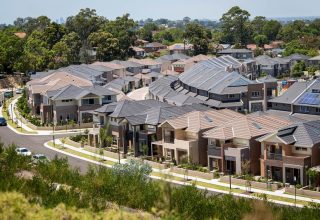

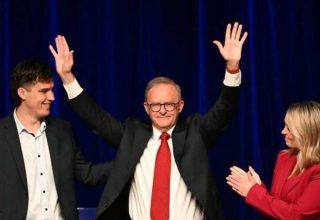
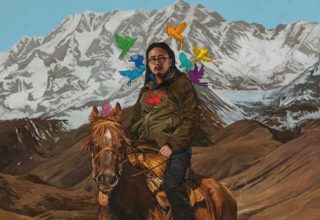


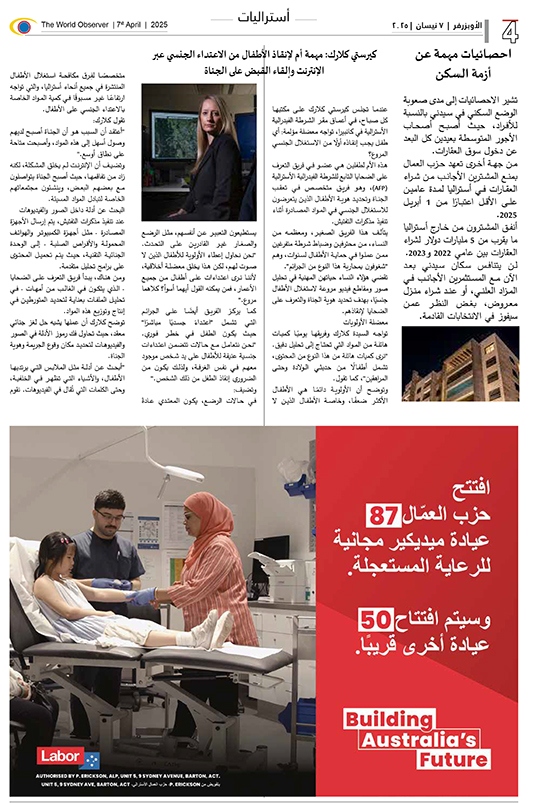
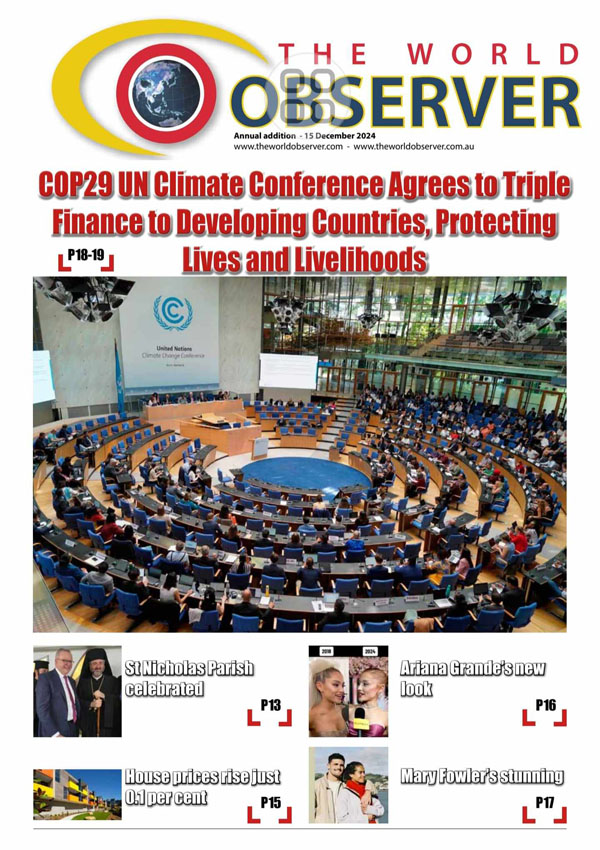
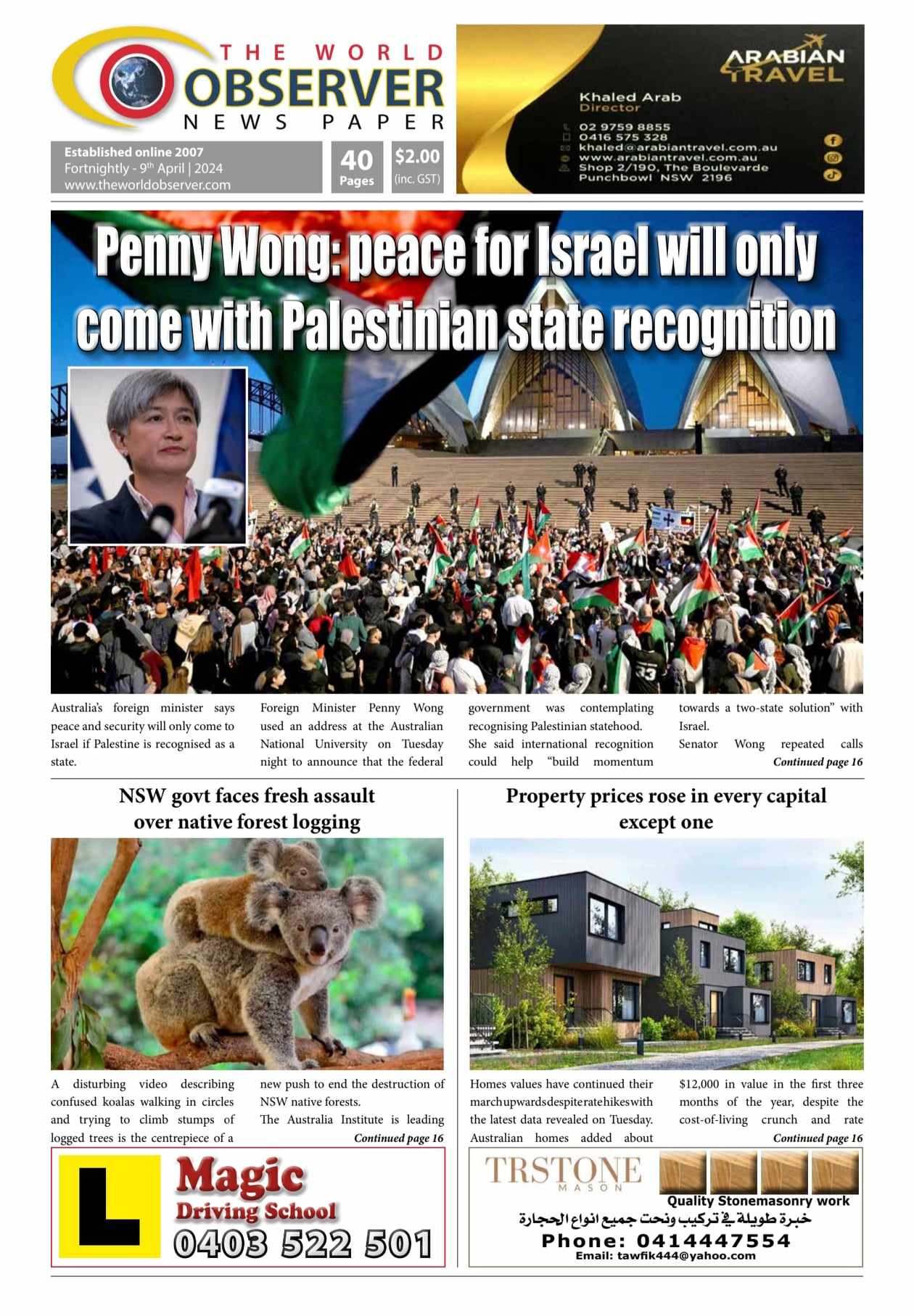
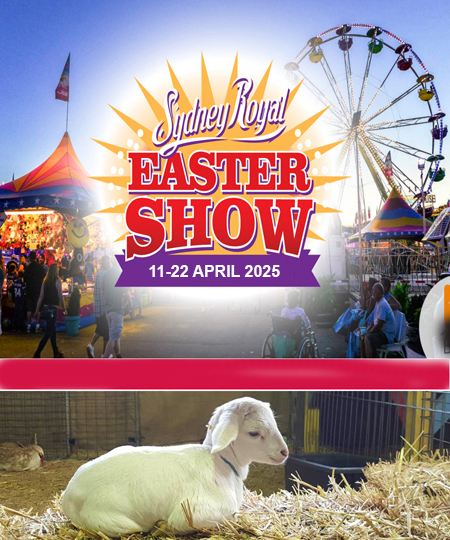
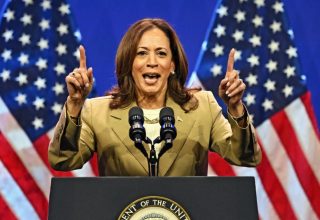



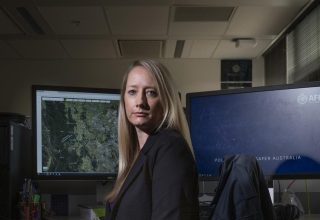























 The World Observer Media produces a daily online newspaper, a daily Arabic online newspaper and a monthly printed Arabic/English magazine and a weekly printed Arabic/English newspaper.
The World Observer Media’s mission is to entertain and educate all generation from the Ethnic Communities in Australia, who are interested in local, national and foreign information.
The World Observer Media produces a daily online newspaper, a daily Arabic online newspaper and a monthly printed Arabic/English magazine and a weekly printed Arabic/English newspaper.
The World Observer Media’s mission is to entertain and educate all generation from the Ethnic Communities in Australia, who are interested in local, national and foreign information. 


